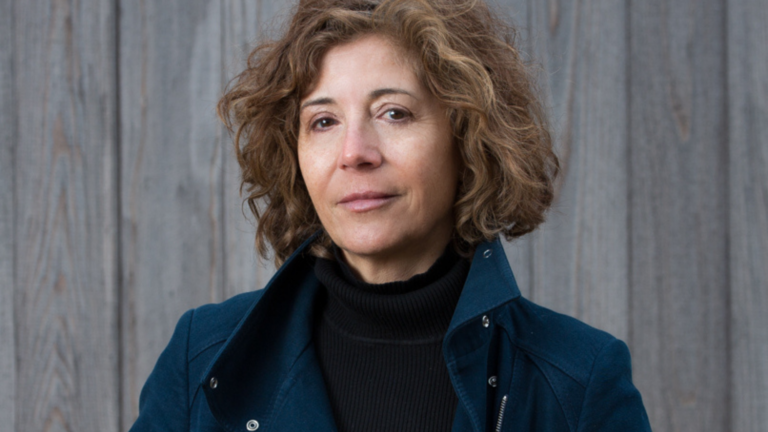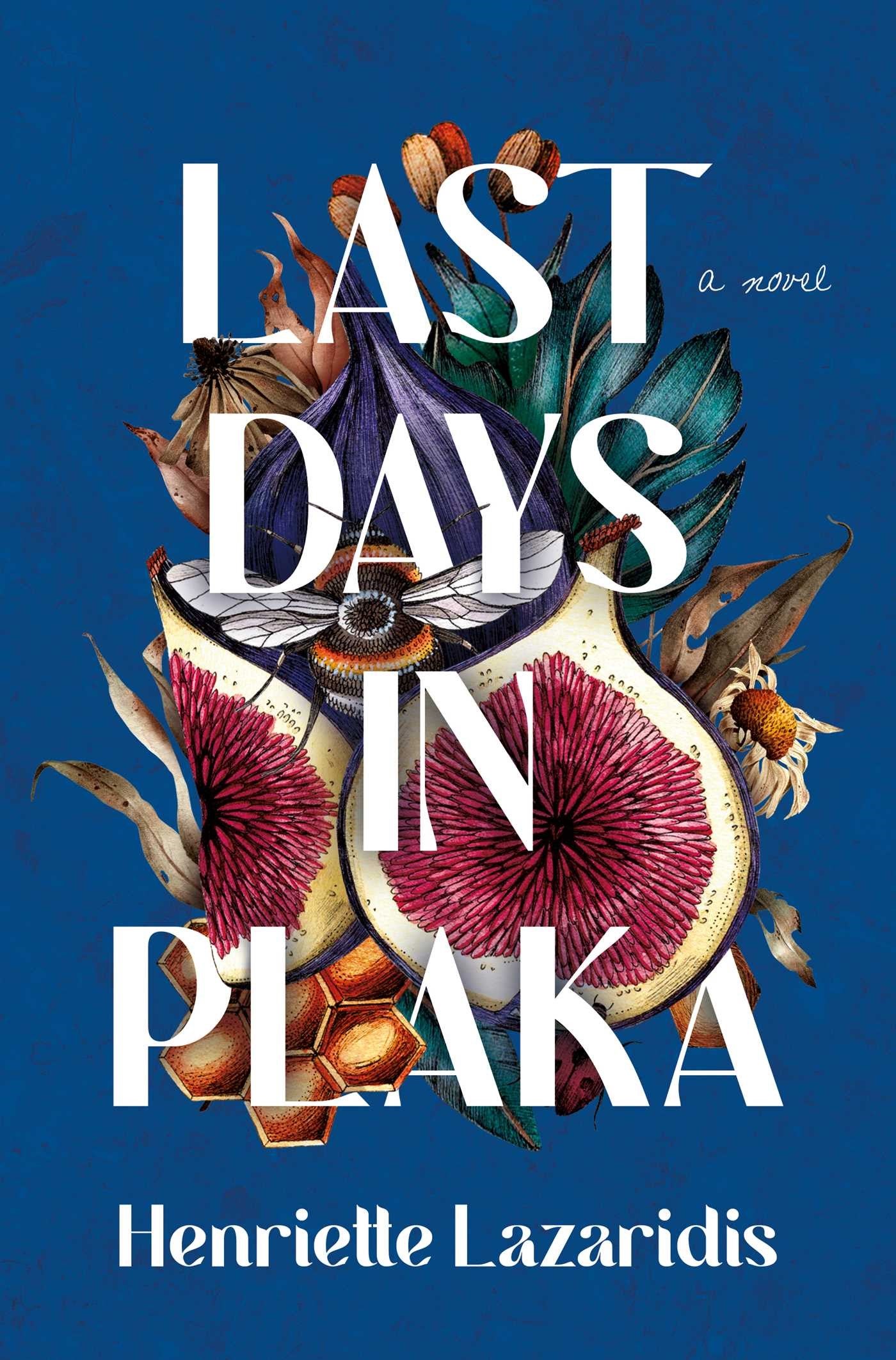📚 Stay up-to-date on the Book Club
Catch up on the latest Boston.com Book Club pick and join the virtual author discussions.

One day in March, Henriette Lazaridis looked at her phone and screamed.
“I didn’t believe it. When I saw the email, I yelled: ‘Wait, what?!’ she tells me with a laugh. “Then I had to keep it a secret for over a month.”
The Cambridge author’s latest novel, “Last Days in Plaka,” became a “Good Morning America” Buzz Pick in April. Lazaridis recorded a 49-second video for the morning show from her Cambridge home. (“It took me, like, 75 takes.”)
GMA: Hats off on this pick.
The former Harvard professor delivers a subtle story of odd-couple friendship, with just enough tug on the line to keep you guessing. Set in the ancient neighborhood of Plaka in Athens — where ice cream kiosks and movie theaters sit by the Acropolis — we explore the unlikely friendship between Anna, a 27-year-old motorbike-riding Greek American street-artist searching for connection to her heritage, and 82-year-old widow Irini, once well-to-do but now dependent on charity.
One day, their local priest suggests Anna bring figs to Irini. (Hence the book cover.) The free-wheelin’ artist becomes fascinated by the octogenarian’s tales: Irini’s estranged child. Lost wealth. An earthquake. I won’t give away spoilers, but as the publisher’s synopsis puts it: Anna makes a decision that “exposes Irini’s web of lies, and compels Anna to confront the limits of her own forgiveness.”
I was hooked from the first two sentences: “This is not her story. She stole it from the young woman who did not realize until the end that it was hers.”
There’s something about omniscient narration that’s just plain easy to fall into — a fairy tale or storybook vibe. Combined with Lazaridis’s knack for dialogue and cinematic storytelling, it keeps you turning pages.

Born to “Greek expats,” Lazaridis was raised in Canton and Lincoln. A Boston GrubStreet instructor, she took up rowing some 34 years ago. Today, you might see her rowing on the Charles River.
I called Lazaridis, 64, for two major reasons: “Plaka” — she has three upcoming local events: May 7 in Wellesley, May 9 in Gloucester, May 16 in Shrewsbury — and, Galiot Press, a new publishing press she’s co-founding with Arlington author Anjali Mitter Duva.
Galiot opens May 20 for submissions. According to their Kickstarter: they aim to publish “books from new voices and traditionally overlooked writers,” with their first three books by autumn 2025. “Books will be available in paperback and e-book formats, and hopefully audio as well.”
We talked Greek street art, Mickey Mouse comics, and her vision for publishing.
Lazaridis: I started it in August of 2020. I was in the middle of working on another novel and feeling stuck. I’m Greek American, I go to Greece about twice a year. I normally would’ve been in Greece that summer, but it was the pandemic. I was missing Greece very deeply. I was aware of our mortality as human beings, that we had time running out, living all these days [in lockdown.]
Those two things were on my mind. One night before I got into bed, the first two sentences came into my head. I was puzzled, because it had nothing to do with anything I was working on.
The next morning, I still had the sentences there, along with the two [protagonists]. I ran with it and wrote my way into the story which is not how I usually work. A few weeks in, I pulled my head up and looked around and said, “Okay, where are we? Where can this story now go?”
This old woman and this young woman. I knew the old woman was “the story thief” — that was my working title. I knew there was something about lying or manipulation. There they were, these two women connected by the basket of figs that a priest had asked one to bring. That surprised me, because I’m not a religiously observant person at all — and in fact, most Greeks don’t go to church every Sunday.
Anna is trying to connect to her parents’ Greek culture. She picked the wrong way. [laughs] If she’d chosen, say, music, she might’ve connected more easily with something her parents had known as their Greece. But she chooses religion, which is a bit misguided.
So here she is, in this church that only has five other people. She’s trying really hard, desperately searching for something— I don’t think she knows what it is.
Not in Greece. I think in Greek American culture, it is. But it’s not how I grew up. My parents emigrated before I was born. They always thought of themselves as expats, rather than immigrants. They didn’t feel themselves to be Greek Americans. So we didn’t go to church. We had our own expat community.
My father grew up at the edge of Plaka, but I chose it because it’s a neighborhood of contradictions and layers. It’s right there by the ancient things. It’s one of the oldest inhabited [areas]. So it has the very ancient, and the touristy tchotchke world. It also has this rooftop movie theater where they go in the book: the Cine Paris. At the movies, if you turn your head to the left, there’s the Acropolis.
So in that one tiny spot, you have ancient history, contemporary life, and whatever life is on the movie screen, layered on top of each other. I wanted that layering of time, of stories, which I couldn’t have gotten in other neighborhoods.
She’s an artist, but she’s just mediocre. Someone asked me: Why didn’t you make her be good at it? [laughs]
But I liked that she’s not going to find transcendence through her art, which, frankly, is how most of us live. We don’t become Michelangelo or Mary Cassatt. [laughs] We’re just making our way.
Almost every surface in Greece is graffitied. On one end of the spectrum, there’s clear vandalism. On the other end, there are commissioned works by famous street artists. But there’s a whole lot in the middle — people who tag in an artistic way. If you Google “street art Athens” you’ll see amazing images. It’s a thing.
No, they didn’t. My father, for most of his childhood, lived in that area. He played on the Acropolis foothills. He actually fell into an ancient well once, and they had to get a policeman. My mother grew up in a different city. Then they married and they had an apartment in the center of Athens.
They came to Boston around 1958. My dad was a mechanical engineer, he came to work at what was then Thermo Electron. I was born here. We lived in Canton, then moved to Lincoln. I’m an only child, we spoke Greek at home. I was two months old when they took me to Greece. In my first passport, I’m this wrinkly little baby.
My mother and I went back every summer; my father would join us for the month of August.
It is. I spoke English with kids in the neighborhood, but at home, it was Greek first. My grandmother taught me to read Greek by using Mickey Mouse comic books. They came out in Greek every Friday. All summer long, I’d get them. When I was home in Massachusetts, she’d send me one every Friday. The comic books were in all capitals. So it took me a while to learn lowercase [laughs]
For years, I’d joke and say, “When I have my publishing company I’m going to do things differently.” I said this looking at certain inefficiencies. I’ve been published by both an independent press and one of the big five. I’ve seen it from both ends of the spectrum, and had very good experiences, by and large, but I could see things I thought I could do better. I’d joke about it. One day, my friend, Anjali said, “You know, if you’re serious about this publishing company, I’ll do it with you.”
At first, we said we’d wait until I was 70. Then a few years ago, we said, “Why are we waiting?” So for the last two years, we’ve been meticulously planning and researching and talking to all kinds of focus groups — with readers, writers, agents, editors, marketing people, booksellers — to make sure we understand the entire business as it exists. And we’ve come up with something that we think is better.
We’re relying on print-on-demand instead of print-runs. You’re not taking as much of a financial risk, so you can take artistic risks. You can choose more books that don’t fit easily into a category. There’s a whole lot of good stuff that isn’t finding its way to readers.
Books that maybe are combinations of genres, that sometimes publishing people will say they don’t know how to sell.
Here’s one: Agents and editors are so hard-working, and often overwhelmed. An agent might get between 100 and 400 query letters a week. There’s no way you can read everything.
We’re doing two things differently with our submissions process. One, we have a reservation system, which is first-come first-serve, and opening times rotate through time zones. You’ll book a week the way you’d book a meal at a restaurant. When you send us your query by Tuesday of week one, you will have an answer by Friday. When our doors are open, they’re open to everyone equally, whether you have an agent or not.
We spent so much time coming up with something.
A galiot is a French boat that uses both sail and oars. So we liked that combination. It’s nimble, it can adapt to changing weather. It lifts people up and carries them together. Also I’m a rower, and Anjali grew up in France. Both of us have a multicultural background. Her mother’s American, her father is Indian, she grew up in France until she came here for college.
No, actually, I was writing another book. A novel about a daughter of a disappeared mother, who is a physicist in 1972.
I know. [laughs] I can’t control where my brain goes.
Interview has been edited and condensed.
Lauren Daley is a longtime books journalist and freelance writer. She can be reached at [email protected]. She tweets @laurendaley1.
Catch up on the latest Boston.com Book Club pick and join the virtual author discussions.

Stay up to date with everything Boston. Receive the latest news and breaking updates, straight from our newsroom to your inbox.
Conversation
This discussion has ended. Please join elsewhere on Boston.com